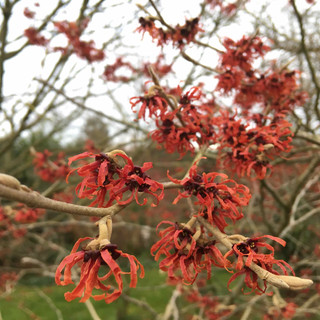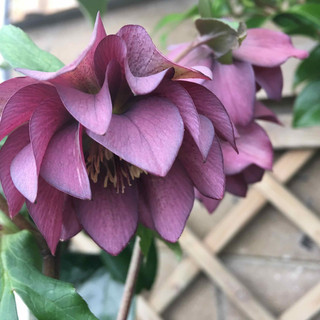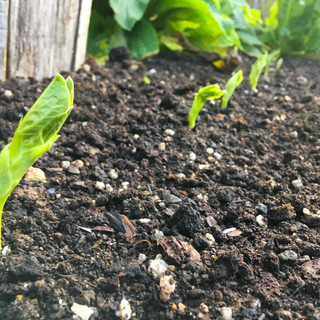January Garden Jobs
- Debi Holland

- Jan 4, 2020
- 6 min read

Happy New Year everyone!
Christmas and New Year have come and gone so now it is time to embrace 2020 and the winter garden.

Surprisingly, due to the mild weather, there are an incredibly large amount of plants that are flowering now. Some defying mother nature and putting in yet another bloom when you would usually expect them to be having a nap at this time of year but it is so important to 'go with the flow' and let nature lead your choice of garden jobs.
Enjoy all the garden gifts whether early, late or timely. (Click on gallery photos to enlarge).
Succulents are absolutely excelling at the moment and are an excellent no-fuss addition to any garden indoors or out. They required very little maintenance but give back so much with their intricate fascinating foliage. Living works of art. Just do not over water them.
And then there is Hamamelis mollis and x intermedia, witch hazel and Chimonanthus praecox, winter sweet. Both a flash of shocking bright colours and sublime scent. No winter garden should be without these gems. Absolute show stoppers this time of year.
As we move through the month, one-by-one, Hellebores appear, as if from nowhere to grace the cold bleak days with sheer exquisite beauty. Wow what a show, so many different varieties to delight and cheer up even the darkest day. From Lenten roses, Picotee Lady, scented to doubles their bowing shy heads radiate charm.
Leave seed heads and grasses throughout winter, these make fantastic homes for wildlife and provide you with some amazing photographic opportunities at dawn, dusk and in the frost.

Try to not tidy up every square inch of your garden. Scoop up any remaining leaves you want for leaf mould and leave the rest - instantly turning your garden into a wildlife hotel. You will be surprised who moves in!

January is a great time to plan new gardening adventures. Perhaps finally book that course you've been promising yourself, learn a new practical skill at a local workshop, ponder gardens and shows to visit or simply sit back with a cuppa, admire last year's garden photos and look through the mountain of seed catalogues that have landed on your mat.
But if you fancy some fresh air then there are a lot of jobs we can do to prepare for the forthcoming season.

January-February are key pruning months for wisteria. Cut back side shoots to two to three buds and this will encourage flower bud growth and promote summer blooms.
Prune standard or bush apple and pear trees (espalier, cordon and fan-trained fruit trees are normally pruned in August) whilst the trees are dormant between leaf fall around November and bud burst in February/early March.
Winter pruning ultimately stimulates new growth but it also improves ventilation, light and shape. Look at your tree and select damaged, diseased or dead material to remove, any visible pests and reduce tree height.
Make sure your tools are sharp so you make clean cuts to reduce damage or fungi infections.

If you are desperate to plant something then now is a perfect time for bare root roses, a tree or shrub. Quick, easy and the cheapest way to buy your desired choice as you are dealing with a small dormant plant but once in situ they respond quickly. Incredibly satisfying.

Nothing more epitomises English summers than the scent of freshly cut sweet peas. Sow sweet pea (Lathyrus odoratus) seeds.
If you have been too busy before Christmas to sow you can still get a head start with your seedlings and have strong shoots by Spring; just keep them protected from frost and mice in a greenhouse or on a windowsill.

Be adventurous - sow something different this year. I won this fabulous 'Grow Your own Areca Palm' kit from Seed Pantry. I am a huge fan of indoor plants so am looking forward to nurturing these seeds through to being full grown palms.
Don't forget the fungi! It is still a good time of year to discover some incredible fungi growing on trees, dead wood and on the forest floors. Fungi are fascinating and are an essential element in the eco system, naturally decomposing organic matter.
Talking of forests, although the days are just beginning to stretch out again, it can sometimes feel a little depressing being cooped up indoors or spending your entire daylight hours at work so seize the day (or weekend!) and grab every opportunity to get outdoors, go for a walk or ride a bike and blow those cobwebs away ...and it is free!. You will feel so much better. Breath in the fresh air and feel inspired and positive; return home with a new lease of life! Nature soothes the soul.
Use this 'quiet' opportunity to read some gardening books. If the weather is miserable it is a good time to catch up on your gardening library. There are so many wonderful books out there, old and new. It is a great source of inspiration and an ideal way to swat up on skills and techniques before the season fully commences again. So snuggle up with your pet and enjoy some winter reading.

Some books I buy brand new as soon as they are released and others I stumble across at charity shops or are gifted. It is a wonderful way to recycle books and give money to charity - love the anticipation of not knowing what I am going to find.
Why not buy a soil testing kit and find out exactly what is going on in your garden. This will help tremendously with understanding which plants will thrive where in your garden and perhaps save you some money by not just making choices . Remember: right plant, right place, Soil is the fundamental basis of every garden so know what you have and then you can make choices based on this knowledge.
My kit is by 'TestWest' and tests soil pH (acidic, neutral or alkaline), nitrogen (N), phosphorus (P) and potassium (K) levels. Easily obtainable at your local nursery, garden centre or online.

Use a garden auger if available, when your soil is not frozen, make sure you dig down the soil profile and do not just take material from the surface. This top soil will not give you a true reading as that will predominately be compost or mulch.
Then comes the fun part - sort through your seed collection and get planning for 2020.
I split my seeds between edibles and ornamentals. I acquired a very useful A-Z box folder for bills which immediately got commandeered for something far more constructive - seed storage. Very useful having them in alphabetical order, otherwise it is amazing how much time you waste repeatedly traipsing through your seeds.
Other January tasks are check overwintering dahlia tubers and pelargoniums for Botrytis, grey mould and rot. Gently remove any rotten material to stop spores spreading.
Have a good tidy up down the allotment and in the greenhouse. Get ready for the new season. Clean pots, get rid of old broken items cluttering up your plot - recycle where possible.

Start forcing rhubarb. On my old allotment my rhubarb was always started very early so cover crowns now. If you have multiple crowns try some forced and some not, you will be amazed at the difference.
There are many crops still producing now. I have eaten 'Redbor' kale, swiss chard and beetroot and surprisingly harvested chillies. Not bad for January! The strawberry patch on my kitchen garden has had a tidy up and I have planted out onion sets and garlic bought from a summer trip to the Isle of Wight Garlic Farm.
Keep bird baths watered (break ice if necessary) and top up bird feeders. Birds really need your help with an extra food boost through the winter months.
Clean and sharpen your tools. Repair any damaged tools or gardening kit and replace if needed. There are surprising amount of tool sales on at the moment. Embrace this opportunity and renew your kit if it cannot be saved. One of my most fundamental daily items used are gloves.
So important to protect your hands. I often work with poisonous plants so gloves are a life saver - literally! Our local gardening club sells (in my opinion) the best gloves on the market for dexterity and protection. I can only describe 'Showa' as 'fitting like a glove!'
They always used to be the gloves sold at Great Dixter. They are not a budget glove and it shows as they last a long time so worth the extra cost (I am not in any way paid by any of these companies shown, this is purely my personal opinion). They are now part of the Kew Garden Spear & Jackson range.
I am also a big fan of the Burgon & Ball Florabrite range, particularly their snips. I have enjoyed using their pocket pruners last year, perfect for getting in around small areas, offers precision cuts for thin material.

Explore outdoors. Blow the cobwebs away with a woodland walk, then sit back, plan and dream.
There are not many opportunities throughout the gardening year where you can genuinely take a breath, this is it basically, so embrace it but get outside into the fresh air and look out for all those emerging bulbs. Snowdrops are appearing and other spring bulbs will not be far behind. Hope is on the horizon.

All the best for 2020!
All photos taken by Debi Holland ©






































































































Comments